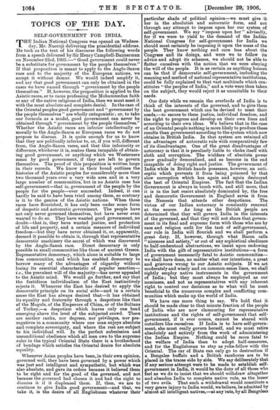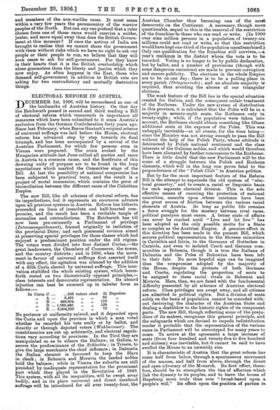TOPICS OF THE DAY.
SELF-GOVERNMENT FOR INDIA. THE Indian National Congress was opened on Wednes- day, Mr. Naoroji delivering the presidential address. He took as the text of his discourse the following words from a speech delivered by Sir Henry Campbell-Bannerman on November 23rd, 1905 :—" Good government could never be a substitute for government by the people themselves." If that proposition is meant to apply to the Anglo-Saxon race and to the majority of the European nations, we accept it without demur. We would indeed amplify it, and say that good government can only be obtained in the cases we have named through "government by the people themselves." If, however, the proposition is applied to the Asiatic races, or to races professing the Mohammedan faith or any of the native religions of India, then we must meet it with the most absolute and complete denial. In the case of the Oriental peoples good government and "government by the people themselves" are wholly antagonistic ; or, to take our formula as a model, good government can never be obtained through "government by the people themselves." Whether the Asiatic races are inferior intellectually or morally to the Anglo-Saxon or European races we do not propose to discuss. It is quite enough for us to know that they are politically inferior to, or, if you will, different from, the Anglo-Saxon races, and that this inferiority or difference, whichever it is, makes them incapable of obtain- ing good government, or anything which we Westerners mean by good government, if they are left to govern themselves. The proof of this proposition is written large in their records. We know in their broad outlines the histories of the Asiatic peoples for considerably more than two thousand years over a very wide area and in a very large number of communities, but in no Asiatic case has self-government—that is, government of the people by the people for the people—ever succeeded. Indeed, it can hardly be said to have been tried among them, so contrary is it to the genius of the Asiatic nations. When those races have flourished, it has only been under some form of despotic and autocratic government. The people have not only never governed themselves, but have never even wanted to do so. They have wanted good government, no doubt—that is, they have wanted justice, and protection of life and property, and a certain measure of individual freedom—but they have never obtained it, or, apparently, deemed it possible to obtain it, through that representative democratic machinery the secret of which was discovered by the Anglo-Saxon race. Direct democracy is only possible in small communities like those of ancient Greece. Representative democracy, which alone is suitable to large free communities, and which has enabled democracy to borrow many of the advantages of oligarchy without losing its essential characteristic of popular sanction- i.e., the prevalent will of the majority—has never appealed to the Asiatic mind. We would go further, and say that the fastidious individualism of the East instinctively rejects it. 'Whenever the East has desired to apply the democratic principle on its social side—and in a certain sense the East has always desired that—it has obtained its equality and fraternity through a despotism like that of the Moguls, of the Emperors of China, or of the Sultans of Turkey,—a despotism which leaves only one head emerging above the level of the subjected crowd. There are neither ranks, nor degrees, nor privileges, nor pre- rogatives in a community where one man enjoys absolute and complete sovereignty, and where the rest are subject to his individual will. In the perfect submission and unconditional obedience which all men owe to the supreme ruler, in the typical Oriental State there is a brotherhood of bondage which satisfies the Oriental desire for absolute equality.
Whenever Asian peoples have been, in their own opinion, governed well, they have been governed by a power which was just and intelligent and sympathetic, but which was also absolute, and gave its orders because it believed them to be right and for the good of the governed, and not because the governed had chosen it and had the right to dismiss it if it displeased them. If, then, we are to continue to give India good government—and that, we take it, is the desire of all Englishmen whatever their particular shade of political opinion—we must give it her in the absolutist and autocratic form, and not through any attempt to impose upon her our system of self-government. We say "impose upon her" advisedly, for if we were to yield to the demand of the Indian National Congress for self-government for India we should most certainly be imposing it upon the mass of the people. They know nothing and. care less about the Congress and its doings, and were we to follow its advice and adopt its schemes, we should not be able to flatter ourselves with the notion that we were obeying the will of the people. It is as certain as anything human can be that if democratic self-government, including the meaning and method of national representative institutions, could be fully explained to that vast multitude which con- stitutes "the peoples of India," and a vote were then taken on the subject, they would reject it as unsuitable to their needs.
Our duty while we remain the overlords of India is to think of the interests of the governed, and to give them the best government which can be devised to meet their needs,—to secure to them justice, individual freedom, and the right to progress and develop on their own linos and according to their own ideas. We believe that in the case of an Oriental people nothing is more likely to produce these results than government according to the system which now obtains in British India. In that system are retained all the advantages of autocratic rule with comparatively few of its disadvantages. One of the great disadvantages of autocracy is that it is peculiarly liable to choke itself with sloth and corruption. The wielders of absolute power grow gradually demoralised, and so become in the end incapable of doing right and justice. The government of India while in British hands possesses, however, an anti- septic which prevents it from being poisoned by that slow corruption which has again and again destroyed the best of Oriental Empires. The fact that the Indian Government is always in touch with, and still more, that it is in the last resort absolutely dominated by, the free and democratic Government in England saves it from the Nemesis that attends other despotisms. The virtue of our Indian autocracy is constantly renewed at the source. As long as the British people are determined that they will govern India in the interests of the governed, and that they will not share that govern- ment in its final and supreme form with those who are by race and religion unfit for the task of self-government, our rule in India will flourish and we shall perform a great duty. If, however, through what Bacon calls "niceness and satiety," or out of any sophistical obedience to half-understood abstractions, we insist upon endowing India with the gift of representative institutions—a form of government necessarily fatal to Asiatic communities— we shall have done, no matter what our intentions, a great and grievous wrong to our Asiatic subjects. If we act moderately and wisely and on common-sense lines, we shall rightly employ native instruments in the government of India ; but they must always be employed as our nominees, and not as representatives with any inherent right to control our decisions as to what will be most beneficial to the numerous complex and conflicting com- munities which make up the world of India.
We have one more thing to say. We hold that it should be made clear to that minute fraction of the people of India who are now clamouring for representative institutions and the rights of self-government that self- government, if it ever comes, cannot be shared with outsiders like ourselves. If India is to have self-govern- ment, she must really govern herself, and we must retire absolutely and entirely from the work of administering the Indian Empire. Nothing could be more fatal to the welfare of India than to adopt half-measures, and for the Englishman to stay as yoke-fellow with the Oriental. The car of State can only go to destruction if a Bengalee buffalo and a British racehorse are to be placed in the traces side by side. We say deliberately that if any serious attempt were to be made to establish self- government in India, it would be the duty of all those who feel as we do to insist that we should withdraw altogether and abandon India to complete native rule, as the lesser of two evils. That such a withdrawal would constitute a very grave injury to India would, we believe, be admitted by' almost all intelligent natives,—at any'rate, by all Bengalees and members of the non-warlike races. It must mean within a very few years the paramountcy of the warrior peoples of the North. But can any one pretend that a ruler chosen from one of those races would exercise a milder, juster, and more equal sway than does the British Govern- ment at this moment ? If once the natives of India are brought to realise that we cannot share the government with them without risks which we have no right to ask our people or their people to run, we believe that they will soon cease to ask for self-government. For they know in their hearts that it is the British overlordship which alone guarantees them the liberty and justice which they now enjoy. As often happens in the East, those who demand self-government in addition to British rule are asking for two contradictory and, mutually destructive things.



































 Previous page
Previous page